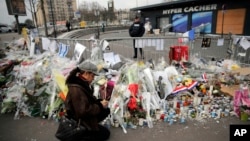January's terrorist attacks in Paris sparked a massive display of solidarity in France. But they've also left a country on the edge. For the far-right National Front party, the attacks confirm what it's warned all along - that France is at war with radical Islam, and that it must bring immigration to a halt.
Alain Barre has nothing against immigration. His own wife is Cuban. He believes generations of European imigrants have made France a better country. But he sees this latest generation of newcomers - many of them Muslims from North and sub-Saharan Africa - as a drain on the economy…and a threat to the country.
"They are not interested to be integrated. They are living, not working, staying in the flat given by the government. Paying nothing, no electricity …because they have no wages, everything is gratis. And French people, real French people, born in this country - paying all their life social cotisation [taxes] - they aren't able to buy a pair of glasses because they have no money for that," said Barre.
He lives in Bagnolet, a bleak suburb of high-rises and rundown buildings. Paris lies just across a busy highway. Communists and now Socialists have long controlled city hall. But Barre votes for the far-right National Front. He believes the big threat for France is Islam. And increasingly, he says, his friends agree.
"They tell me if we [do not react] in a few years it will be civil war in France. After the Jasmine revolution [in Tunisia/and larger Arab Spring], all these Arab, Maghrebin [North African] people, and Syria…they are leaving, arriving in Lampedusa and going to France and the UK. And UK is also completely invaded by Muslims," he said.
That's the kind of rhetoric the National Front embraces. After January's terrorist attacks, the party came out with a new flyer. It portrays jihadist fighters and the map of France, with the message: "Islamist peril: Let's Protect the French."
In one interviews aired on French TV, National Front leader Marine Le Pen says that for years her party has raised the alarm against Islamist fundamentalism. Even today, she says, political rivals fail to offer the right answers: to end immigration and close French borders.
Since its founding in the 1970s, the Front has always gone it alone, sidelined and defiant of mainstream politics. Even so, it's surged in the polls in recent years - it captured 25 percent of the vote in European Union elections last May…although few French publicly admit to voting for it.
The Front again appeared alone after the January attacks. It did not join a massive solidarity march in Paris - it staged its own small rally elsewhere. The country's unpopular President Francois Hollande, who did join the march, has seen his ratings double. But analysts predict that bounce won't last. And as the mourning ends, and questions mount about security and radical Islam, sociologist Michel Wieviorka says the Front's law-and-order, anti-immigration message may prevail.
"People will say 'the Left is unable to change [things]. The Right is unable to change," said Wieviorka. "So let's try something else. Let's try Marine le Pen.'"
France's struggling economy and historic unemployment levels have also left the ruling Socialists struggling for answers, and boosted the Front in the polls. In fact, a new poll shows Le Pen would win the first round of presidential elections (in 2017) if they were held today - but lose in the second.
The Front even seems to be making a mark in leftist towns like Bagnolet, which have high immigrant populations. During a stroll downtown, Barre stops to chat with a friend of his - a butcher called Gilbert.
"I've worked in Bagnolet for 40 years and have seen the changes. There are no more French in the town. I used to vote Communist - but that's changed because of the foreign population that's invaded," said Gilbert.
Pharmacist Herve Atlan is also worried about what's happening to France. He used to shop at a kosher grocery store in Paris that attacked last month by Islamist Amedy Coulibaly. His kids go to a Jewish school just across the way.
"The government says great things about protecting Jews like myself- but there's no action. But the National Front is not the solution either," said Atlan.
Up the street is a beautiful mosque. The doors are locked. Malian father and son, Gibril and Amara walk by.
Asked if they feel targeted by people distrustful of Islam since the attacks, Gibril says no. Amara disagrees.
"French and the media mix up Islamists with good Muslims, who pray every day and go to work," said Amara.
Back in the town center, Aouahid Tamin and Tahar Azoula have just left Bagnolet's town hall. Both are French Muslims, born here to parents from North Africa. Both are looking for work. It's hard they say - and their Muslim names makes it harder.
Tamin says he doesn't support any political party - but he might vote for Le Pen.
"I know she's anti-Islam, and against North Africans. She's more in favor of people with blond hair and blue eyes. But we like the fact she's not a hypocrite. And she'd shake things up…put things in order," said Tamin.
A first test of how the Front's message will resonate in this charged atmosphere comes in just a few weeks. France holds regional elections in March. A recent survey finds the party ahead in the first round - favored by 26 percent of expected voters. In Bagnolet, Barre is certain they will do well. Because, he says, French are really fed up.




